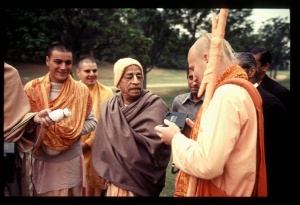CC Madhya 17.15

A.C. Bhaktivedanta Swami Prabhupada
TEXT 15
svarūpa kahe,—ei balabhadra-bhaṭṭācārya
tomāte su-snigdha baḍa, paṇḍita, sādhu, ārya
SYNONYMS
svarūpa kahe—Svarūpa Dāmodara Gosvāmī said; ei—this; balabhadra-bhaṭṭācārya—Balabhadra Bhaṭṭācārya; tomāte—unto You; su-snigdha—affectionate; baḍa—very; paṇḍita—educated; sādhu—honest; ārya—advanced in spiritual consciousness.
TRANSLATION
Svarūpa Dāmodara then said, “Here is Balabhadra Bhaṭṭācārya, who has great love for You. He is an honest, learned scholar, and he is advanced in spiritual consciousness.
PURPORT
Śrī Caitanya Mahāprabhu wanted a new man, not a person like Kālā Kṛṣṇadāsa who would fall for women. Svarūpa Dāmodara therefore immediately pointed out a new brāhmaṇa named Balabhadra Bhaṭṭācārya. Śrī Svarūpa Dāmodara Gosvāmī had studied this person very thoroughly and had seen that he had great love for Śrī Caitanya Mahāprabhu. Not only did he love the Lord, but he was also learned and honest. He was not duplicitous, and he was advanced in Kṛṣṇa consciousness. According to a Bengali proverb, ati bhakti corera lakṣaṇa: “Too much devotion is a symptom of a thief.” A person who assumes himself to be a great devotee but mentally is thinking of something else is duplicitous. One who is not duplicitous is called sādhu. Svarūpa Dāmodara immediately pointed out that Balabhadra Bhaṭṭācārya was quite fit to accompany the Lord because he was a learned scholar and was simple and had great love for Śrī Kṛṣṇa Caitanya Mahāprabhu. He was also advanced in Kṛṣṇa consciousness; therefore he was considered appropriate for accompanying the Lord as a personal servant.
The words snigdha (“very peaceful”) and su-snigdha (“affectionate”) are used in verses fourteen and fifteen respectively, and they are also found in Śrīmad-Bhāgavatam (SB 1.1.8): brūyuḥ snigdhasya śiṣyasya guravo guhyam apy uta. “A disciple who has actual love for his spiritual master is endowed, by the blessings of the spiritual master, with all confidential knowledge.” Śrīla Śrīdhara Svāmī has commented that the word snigdhasya means prema-vataḥ. The word prema-vataḥ indicates that one has great love for his spiritual master.